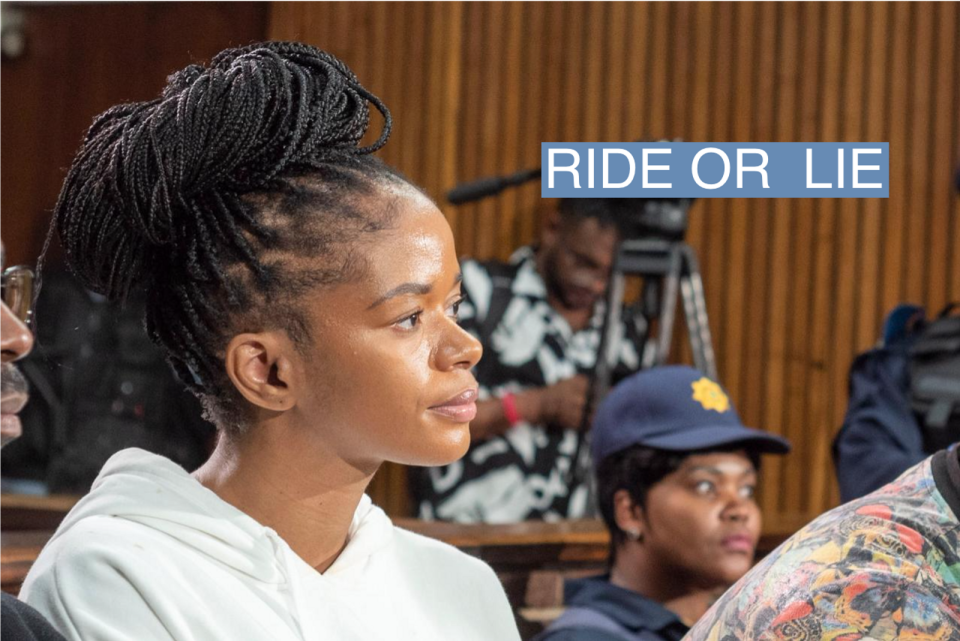Thabo Bester saga reveals the dangers in South Africa's prison privatization
The Scene
CAPE TOWN — It was an average Thursday for Thabo Bester and Nandipha Magudumana. In a moment from that day last June, caught on camera, they bought orange juice at a grocery store in the upmarket Johannesburg suburb of Sandton. Bester wore sunglasses and Magudumana was clad in cream-colored garb.
The scene, as benign as it may seem, signaled the start of what has turned out to be a tale of Hollywood proportions. Bester, a convicted rapist and murderer, was meant to have died by arson-inflicted suicide in his prison cell a month earlier, in May 2022. But the photographs of the shopping trip, published in March this year, raised questions about whether Bester was really dead. A subsequent investigation revealed that he escaped and the burned body in Bester’s jail cell was that of Katlego Mpholo, who, an autopsy report concluded, died due to blunt force trauma to the head.
The story has dominated South African news media since the photographs were published. From the audacious prison break and being found with multiple passports in Tanzania to the fake multimillion-rand media company he operated from behind bars, this tale continues to take sharp twists and turns.
Know More
Bester was convicted and handed a life sentence for the rape and murder of his girlfriend in 2012. A year earlier he was found guilty of two separate rape charges. He is known as the 'Facebook rapist' because he used the social media site to manipulate and lure women before attacking them.
He was smuggled out of prison in May 2022 to live a luxurious life in Sandton — a neighborhood home to some of the most expensive houses on the continent — for a year before he was re-arrested.
Bester was arrested in Tanzania last month, along with Magudumana. Bester is currently facing 11 charges, including fraud, escaping from lawful custody, defeating the ends of justice, and violating a body.

Marché's view
This story is really about the dismal state of South Africa's prisons and the dangers of poorly considered privatization. The local media has seized on the Bonnie and Clyde narrative. That’s understandable — it's juicy and, as more details emerge, increasingly bizarre. But, on closer examination, the story raises questions about the safety and effectiveness of the private sector's role in running the country’s penitentiaries.
Bester was held in Mangaung Correctional Center (MCC), around 12 miles from the country’s legislative capital Bloemfontein. It was South Africa’s first privately-run prison when it opened in 2001. Just over 20 years later, it is one of only two private prisons in the country. Operated by G4S, a multibillion-dollar British security firm, the prison has been under scrutiny for over a decade.
Private prisons — which are technically Public Private Partnerships (PPPs) — appeared on the radar after the Department of Correctional Services (DCS) approached the National Treasury in the late 90s for funds to build more prisons. Inmate populations were ballooning and overcrowding was a major concern. While the Treasury denied the request for funds, it did suggest entering into a contract with private entities to build, maintain and operate the facilities. Thus, PPPs were born.
But within a few years of MCC's opening there were signs that something was amiss. In 2012, South Africa’s Wits Justice Project investigated prisoners' claims that they were being severely abused, electroshocked, and forcibly injected with anti-psychotic drugs.
The South African government has failed to address these allegations. Meanwhile, the financial reward of privatization to high-level officials has resulted in potential scandals being swept under the rug.
While DCS has subsequently terminated its contract with G4S, some argue that journalists — such as those at GroundUp, the South African not-for-profit news agency that published the images of Bester and Magudumana shopping — did what authorities have refused to do for decades.
Investigative journalist Ruth Hopkins, who has reported on MCC for a decade, says that what we currently know happened inside the private prison is just the tip of the iceberg and that the Bester case has highlighted extreme levels of collusion facilitated by privatization.
"The problem with privatization is that in private prisons everything has a price tag. People are busy filling their pockets," she told Semafor Africa. "Corruption has been going on since the prison opened its doors. Thabo Bester is the symptom of a much larger disease."
Room for Disagreement
Private prisons are effectively fulfilling their mandate, DCS spokesman Singabakho Nxumalo told Semafor Africa. He said "there are no challenges" at Kutama Sinthumule Correctional Centre, another private prison that is located in the northern Limpopo Province and is run by U.S. security company GEO Group.
The View From London
A G4S spokesperson defended MCC’s “strong track record” over 22 years and noted that in 2012 the prison was assigned the highest rating for a correctional center by South Africa's Judicial Inspectorate of Correctional Services. "G4S is committed to investment in South Africa but it remains G4S’s firm intention to discontinue all investment in correctional services [in the country]," they added.
Notable
In 2021, Nigerian journalist Ibiba Don Pedro reported on the impact of G4S's presence in the oil-rich Niger Delta where it provides security for oil companies. The company fostered "a culture of maximizing profit at the expense of workers’ internationally recognized labor rights," she wrote.

